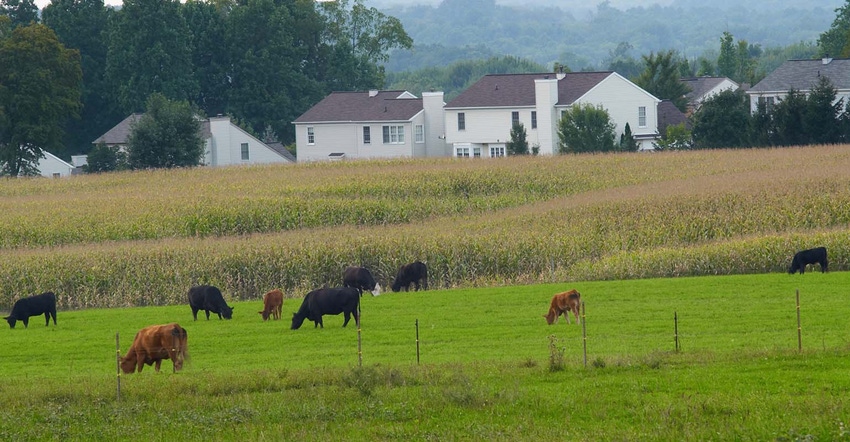May 9, 2018

“Farms Under Threat: The State of America’s Farmland” sounds a stark warning: The loss of farmland is serious and will accelerate unless we take action. Among the report’s key findings:
Between 1992 and 2012, almost 31 million acres of farmland were lost, equal to all the farmland in Iowa,
Nearly twice the area of farmland was lost than was previously shown,
11 million of those acres were among the best farmland in the nation,
Development disproportionately occurred on agricultural lands, with 62% of all development occurring on farmland, and
Expanding urban areas accounted for 59% of the loss. Low-density residential development, or the building of houses on 1-to-20-acre parcels, accounted for 41%.
“Farms Under Threat: The State of America’s Farmland” is the first step in a multifaceted initiative launched by the American Farmland Trust, which released the report. A separate report will be released later this year that analyzes past farmland loss state by state and looks at the effectiveness of state farmland protection policies. Then AFT will assess a range of future threats, forecast potential impacts to 2040 at a county level and recommend effective policies at all levels that help conserve agricultural land.
“Farmland is critical infrastructure, akin to roads and bridges,” said John Piotti, AFT’s president and CEO. “Without farms, there’s not only no food, but there’s no future. We need farmland to feed us and sustain our economy—but also to help restore our planet.
“Action is needed now because lost farmland is irretrievable,” he continued. “Farmers are aging, and the land they steward must be passed on to the next generation. If the trends of the last two decades continue over the next two decades, America will face a future with too few farms.”
“Maps of the contiguous United States released as part of the report show actual patterns of farmland loss within counties,” said Dr. Ann Sorensen, AFT’s research director. “It identifies the best agricultural land nationwide by determining which land is most productive, most versatile and most resilient.”
Who is American Farmland Trust working with on the reports?
AFT is working with Conservation Science Partners, a nonprofit conservation organization, to ground the report’s findings in reliable data and science. Both financial and technical support has been provided by the USDA National Resource Conservation Service. A National Advisory Committee provides additional guidance.
American Farmland Trust’s goal with the release of this study is:
to get people to appreciate the urgency of the situation,
help them see the importance of farmland to our society and
understand what can be done to stem the loss.
What’s at stake?
Allowing large-scale farmland loss to continue imperils our ability to feed our growing population.
Farmland loss challenges our economic prosperity.
Agriculture accounts for $1 trillion of the U.S. GDP, each dollar stimulating $1.27 in additional activity.
Farmland protects wildlife and helps reduce air and water pollution.
Farmland sequesters carbon in soil and plants, holds more water in drought, suppresses fire and provides for flood control in extreme weather conditions.
Farmland contributes to the lifestyle we all treasure—as well as scenic views, open space and recreation.
What can be done?
Plenty can be done to slow the loss of agricultural land, much of which already falls under American Farmland Trust’s day-to-day mission. However, more support is needed from federal policymakers, farmers and landowners, local and state planning authorities and the public. The report shares AFT’s recommendations for effective action.
View the full report at http://www.farmland.org/FarmsUnderThreat.
Source: American Farmland Trust
You May Also Like




